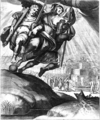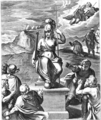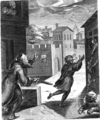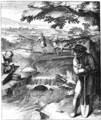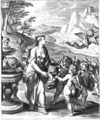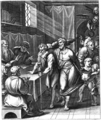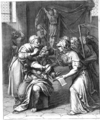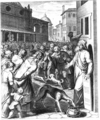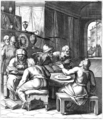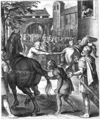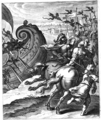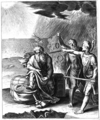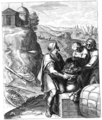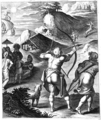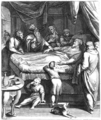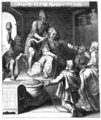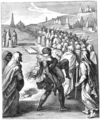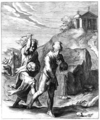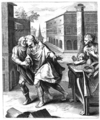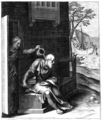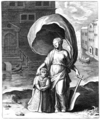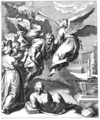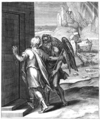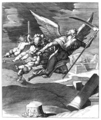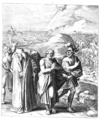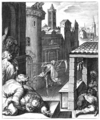In quocunque vitæ genere philosophari licet. [72]
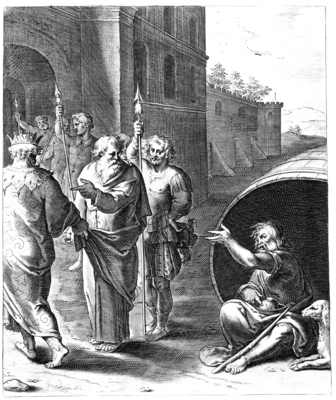
IN QVOCVNQVE VITÆ GENERE PHILOSOPHARI LICET.
Laert.li.
2. c.8.
Aristippus Philosophus Alexandro Macedonum regi, cùm ob sapientiæ stu-
dium, tum ob morum facilitatem, gratus acceptusque fuit. Diogenes aulicam vi-
tam philosopho non conuenire existimans, Aristippum, vt sorte sua minimè con-
tentum, arguebat: cuius monitionem eludens Aristippus, Si scires, inquit, regibus vti,
olus ac mendictiatem fastidires. Munus certè Philosophi est, circa Principes versari,
vt eos doctiores, melioresque reddat.
2. c.8.
Aristippus Philosophus Alexandro Macedonum regi, cùm ob sapientiæ stu-
dium, tum ob morum facilitatem, gratus acceptusque fuit. Diogenes aulicam vi-
tam philosopho non conuenire existimans, Aristippum, vt sorte sua minimè con-
tentum, arguebat: cuius monitionem eludens Aristippus, Si scires, inquit, regibus vti,
olus ac mendictiatem fastidires. Munus certè Philosophi est, circa Principes versari,
vt eos doctiores, melioresque reddat.
No es justo, que Diogenes condene
Por su espiritu pobre, alque tenia
El mas sabio Aristipo, que regia
A quien de Magno el sobre nombre tiene;
Que al Rey, y al reyno todo le conuiene,
Tener al lado siempre noche, y dia
Maestros, que trabajen à porfia
En dar altiempo loque altiempo viene,
Pues sabe vsar del Rey y dela corte,
Tan bien como del hiermo el hermitaño
El sabio con virtud, que es sabio en todo;
Y es disparate imaginar que importe,
Comer yeruas, ò pauos, pues el daño
Dizen, y bien, que solo esta en el modo.
Por su espiritu pobre, alque tenia
El mas sabio Aristipo, que regia
A quien de Magno el sobre nombre tiene;
Que al Rey, y al reyno todo le conuiene,
Tener al lado siempre noche, y dia
Maestros, que trabajen à porfia
En dar altiempo loque altiempo viene,
Pues sabe vsar del Rey y dela corte,
Tan bien como del hiermo el hermitaño
El sabio con virtud, que es sabio en todo;
Y es disparate imaginar que importe,
Comer yeruas, ò pauos, pues el daño
Dizen, y bien, que solo esta en el modo.
Tot Aristip Diogenes seyde
So ghy in moes ghenoeghingh vont /
Wt 'thof der Heeren ghy haest scheyde /
Maer Aristippus sprack terstont /
Kond' hem na 'thof Diogenes voeghen /
Met moes soud' hy hem niet ghenoeghen.
De wijsheyt volghen / sotheyt vlien /
In alle staten kan gheschien.
So ghy in moes ghenoeghingh vont /
Wt 'thof der Heeren ghy haest scheyde /
Maer Aristippus sprack terstont /
Kond' hem na 'thof Diogenes voeghen /
Met moes soud' hy hem niet ghenoeghen.
De wijsheyt volghen / sotheyt vlien /
In alle staten kan gheschien.
Diogene dicea, se tu contento
Fussi d'herbe, Aristippo, o d'esca humile,
Sprezzaresti la corte, l'or, l'argento,
E tu (rispose l'altro piu Gentile)
Se seruirti de i Rè sapessi attento,
Hauresti in odio cibo cosi vile,
Ammaestrar' il Prencipe conuiene,
Si serue il saggio d'ogni cosa in bene.
Fussi d'herbe, Aristippo, o d'esca humile,
Sprezzaresti la corte, l'or, l'argento,
E tu (rispose l'altro piu Gentile)
Se seruirti de i Rè sapessi attento,
Hauresti in odio cibo cosi vile,
Ammaestrar' il Prencipe conuiene,
Si serue il saggio d'ogni cosa in bene.
Diogene hoste d'vne tonne,
Viuotant, en repos, de choux,
Estime son viure aussy doux,
Que celuy, qui les grands talonne.
Aristippe acostant les Rois
En vne robbe d'escarlate,
Fait plus de bien à ses bourgeois
Par sa vie plus delicate.
Viuotant, en repos, de choux,
Estime son viure aussy doux,
Que celuy, qui les grands talonne.
Aristippe acostant les Rois
En vne robbe d'escarlate,
Fait plus de bien à ses bourgeois
Par sa vie plus delicate.
Demeure en vn tonneau pauure comme vn Cinique,
Ou sois Aristippus viuant aupres des Roys,
Tu peux de la vertu tousiours suiure les loix,
La Cour n'altere point l'ame philosophique.
Ou sois Aristippus viuant aupres des Roys,
Tu peux de la vertu tousiours suiure les loix,
La Cour n'altere point l'ame philosophique.
Translations
Literature
- Henkel and Schöne, Emblemata
 , col. 1161-1162
, col. 1161-1162
Sources and parallels
- Diogenes, Lives
 , p/no. VI 26. 37. 55
, p/no. VI 26. 37. 55 - Heacht, Mikrokosmos
 , embl. 36
, embl. 36 - Vondel, Gulden winckel
 , embl. XXXVI
, embl. XXXVI
References, across this site, to this page:
No references to this emblem or page found.Iconclass
- plants and herbs: cabbage
[25G4(CABBAGE)]

- low hill country
[25H114]

- arm raised upward (+ warning, admonishing)
[31A2511(+9324)]

- arm stretched forward (+ indicating, pointing at)
[31A2512(+931)]

- index finger forwards, pointing, indicating
[31A25552]

- grasping something
[31A2745]

- dog (+ lying animal)
[34B11(+9536)]

- palace
[41A11]

- wooden container: barrel, cask
[41A775]

- bowl
[41C345]

- vegetables (with NAME)
[41C652(CABBAGE)]

- walking-stick, staff
[41D263]

- crown (symbol of sovereignty)
[44B191]

- mantle, gown, dress (symbol of sovereignty)
[44B197]

- guard duty, keeping sentry
[45B31]

- helved weapons, polearms (for striking, hacking, thrusting): lance
[45C14(LANCE)]

- 'Philosophia'; 'Filosofia' (Ripa)
[49C20]

- scroll
[49L71]

- Harmony, Regularity (+ emblematical representation of concept)
[51D2(+4)]

- Independence, Autonomy (+ emblematical representation of concept)
[51E1(+4)]

- Wealth, Opulence; 'Opulenza', 'Richezza' (Ripa) (+ emblematical representation of concept)
[55B1(+4)]

- Poverty; 'Poverté', 'Poverté del doni', 'Poverté in uno ch'habbia bell'ingegno' (Ripa) (+ emblematical representation of concept)
[55BB1(+4)]

- Virtuousness; 'Amor di Virtù', 'Attione virtuosa', 'Guida sicura de' veri honori', 'Virtù', 'Virtù insuperabile' (Ripa) (+
emblematical representation of concept)
[57A6(+4)]

- proverbs, sayings, etc. (with TEXT)
[86(IN QUOCUNQUE VITAE GENERE PHILOSOPHARI LICET)]

- non-aggressive activities of Alexander the Great
[98B(ALEXANDER THE GREAT)5]

- non-aggressive activities of person from classical history
[98B(ARISTIPPUS)5]

- Alexander's visit to Diogenes, who sits by his barrel and asks Alexander to get out of his light (+ variant)
[98B(DIOGENES)51(+0)]

![[H O M E : Emblem Project Utrecht]](/static/images/rd-small.gif)







